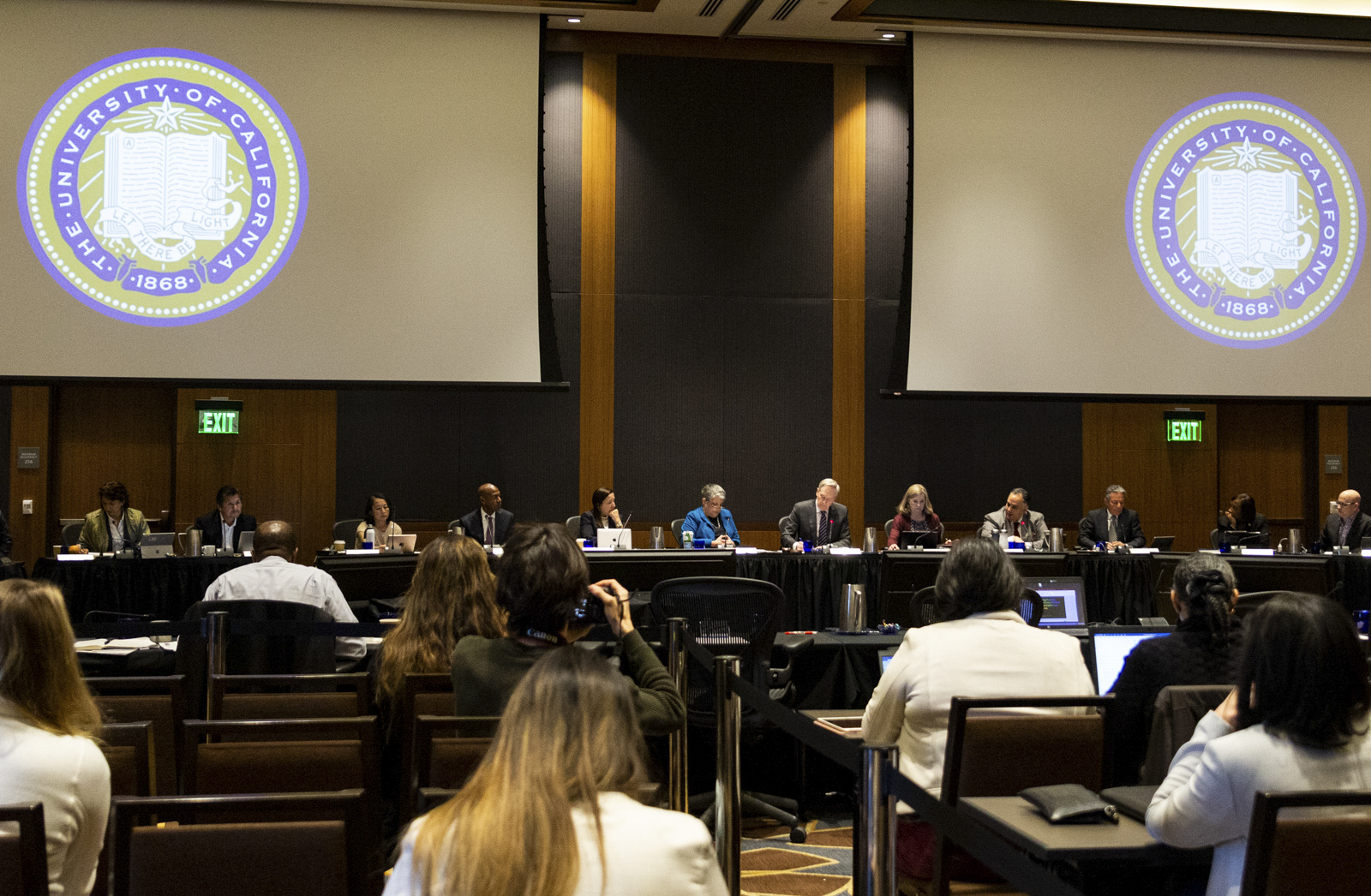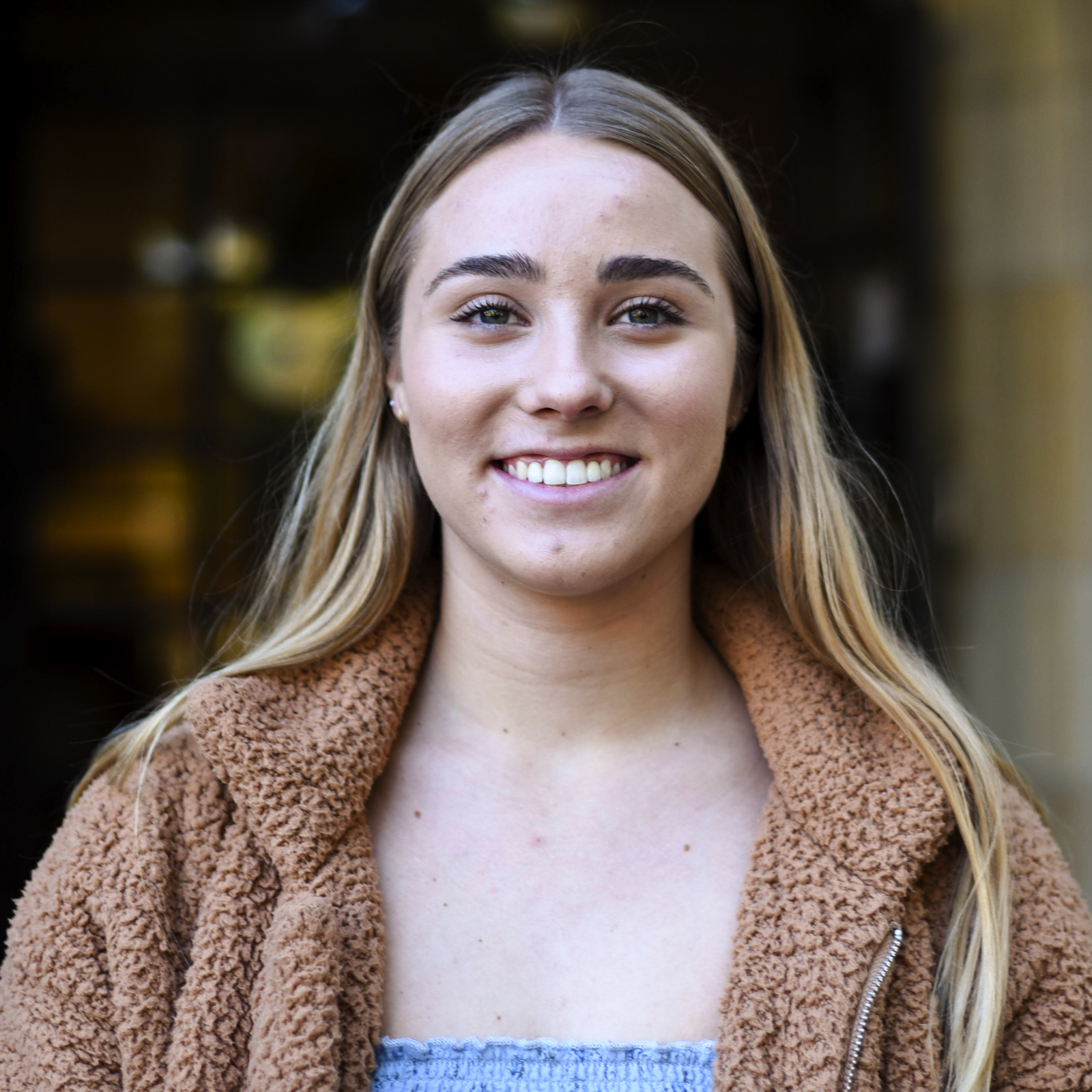UC Regents recap – July 16-17

The University of California Board of Regents discussed a systemwide audit of its admissions process and policies, students’ mental health and student loan debt among undergraduate students on the first and second days of its July meeting.(Ashley Kenney/Daily Bruin)
The governing board of the University of California met for the first and second days of its July meeting at UC San Francisco on Tuesday and Wednesday. The Board of Regents discussed a systemwide audit of its admissions process and policies, students’ mental health and student loan debt among undergraduate students.
Special Committee on Basic Needs
- Elizabeth Halimah, associate vice provost of the Office of Diversity and Engagement, spoke to the committee about supporting the financial literacy of UC students. Darren Chow, a rising third-year business administration and English student at UC Berkeley, spoke during the presentation about his experiences as a senior peer financial educator for a UC Berkeley program. He said he thinks the UC should prioritize teaching students financial literacy.
- Student Regent Hayley Weddle, the chair of the Special Committee on Basic Needs, said the committee is set to end in 2020, at which time they will provide a final report on a long-term vision to address basic needs across the UC.
- Halimah said the new state budget will provide the UC with $18.5 million for issues relating to students’ basic needs, with $15 million going to alleviating food and housing insecurity and $3.5 million to supporting rapid rehousing efforts.
- David Alcocer, the associate vice president of the Budget Analysis and Planning office, said $5 million will be distributed among the campuses in a base allocation, $7 million will be allocated to the campuses based on the number of food-insecure or homeless students they have, $2.5 million will be awarded for innovation grants and $500,000 will be dedicated to coordination and evaluation.
- Alcocer added an addition $1.5 million will be distributed among the campuses in a base allocation, while the remaining $2 million will be allocated based on the number of homeless students at each campus.
Board of Regents
- Students urged the board to support Senate Bill 24, which will provide medical abortions on campus during public comment. Phoebe Abramowitz, a UC Berkeley alumna, said every month nearly 200 UC students seek abortion medication off campus.
- Both students and faculty urged the UC to stop investing in fossil fuel businesses. Geoffrey Lee, an associate professor of philosophy at UC Berkeley, said the UC faculty recently voted to recommend that the regents divest from fossil fuel companies.
- Robert May, the chair of the Academic Senate, said the UC Academic Senate voted with a 77% majority to recommend the regents divest from fossil fuel companies. May urged the regents to implement this call, adding that the regents should develop an explicit path to fossil fuel divestment.
- UC President Janet Napolitano said Elsevier discontinued the UC’s access to certain scholarly articles July 10. She said the UC and its libraries are prepared to help students and faculty access articles that are no longer available with Elsevier. Napolitano added the UC believes open access is an important issue for ensuring UC research reaches its worldwide audience.
Ethics, Compliance and Audit Committee
- Matthew Hicks, the systemwide deputy audit officer, and Alexander Bustamante, the senior vice president and chief compliance and audit officer, gave an update on the UC’s systemwide audit of admissions policies and processes following the Varsity Blues scandal. Hicks said they made 34 recommendations to the UC to reduce the risk of admissions fraud. He added there will also be an internal audit follow-up in which each campus will address recommendations, as well as an additional internal audit and a state audit.
- Hicks added they are looking to complete a number of other systemwide audits next year into foreign influence, undergraduate admissions, executive compensation, outside professional activities, fair wage/fair work and UC Payroll, Academic Personnel, Timekeeping and Human Resources readiness assessments.
- Kurt Sjoberg, vice president and board chairman of Sjoberg Evashenk Consulting, and Marianne Evashenk, president of Sjoberg Evashenk Consulting, discussed the UC’s implementation of recommendations from a state audit on the UC Office of the President administrative expenditures. They said the UC has completed nine out of 10 recommendations for the first year and nine out of 11 recommendations for the second year.
- Ken Smith, the executive director of environmental health and safety, gave an update on the UC herbicide task force, which was formed after the UC temporarily suspended the use of glyphosate-based herbicides June 1 due to concerns over its impact on the environment and the health of students and faculty. Smith said they are currently testing for alternatives.
Public Engagement and Development Committee
- Brad Buchman, the medical director of student health and counseling at UC Health, said Counseling and Psychological Services centers have seen a 78% increase in unique clients over the past 10 years. Angela Gilliard, legislative director for health sciences and services at the UC, said the UC would like to work with the California Mental Health Services Oversight and Accountability Commission to demonstrate the increasing demand for mental health services within the UC.
- Alumni Regent Christine Simmons, who also serves as the vice chair of the Public Engagement and Development Committee, said the committee would be holding its first off-site meeting in September at the Mann UCLA Community School. Simmons said they hope the meetings will help to increase support from the community by engaging with the public. She added the second meeting will be held at a community college and the third meeting at UC Merced.
Finance and Capital Strategies Committee
- Victoria Slivkoff, global head of strategic partnerships in the Office of Innovation and Entrepreneurship, said her office hopes to emphasize more communication, coordination and collaboration between campuses.
- The committee delayed a vote on an action item to increase the employer contribution rate for the UC Retirement Plan. The action would gradually increase the employer contribution rates due to decreases in inflation assumptions and mortality rates.
Academic and Student Affairs Committee
- Caroline Siegel-Singh, the 2018-2019 UC Student Association president, and Shawn Brick, the interim director of student financial support at UCOP, presented a discussion item regarding student debt patterns among UC undergraduate students. The main goals of their report were to show ways to close equity and financial aid gaps as well as to reform the Cal Grant, they said. Another goal was to better address the total cost of college, taking into account expected family and student contributions.
- Data presented by the committee indicated that lower income students are more likely to borrow money from federal financial aid programs. This was also found to disproportionately affect underrepresented students, such as African American and Latino students. The data also suggested that underrepresented groups are more likely to borrow money regardless of family income.
- Jazz Kiang, student committee observer and a graduate student at UCLA studying higher education, said he supports the report and research being put forward, but urged the regents to also look toward larger structural problems affecting underrepresented students.
- Vice Provost of Academic Personnel and Programs Susan Carlson, Associate Vice Provost and Executive Director of the California Digital Library Günter Waibel and University Librarian and Chief Digital Scholarship Officer Jeffery MacKie-Mason presented updates on the UC’s goals for future contracts with Elsevier and other publishing companies.
- Waibel said the UC authors publish 50,000 articles per year, but only 15% are freely available for the public. He added only 6% of UC-authored articles hosted by Elsevier are free to the public.
- MacKie-Mason said although he thinks universities should be able to hire outside companies to publish research, a few publishing companies currently dominate the market. Waibel said the UC is working toward a model that would make research available to the public for free, as well as one that sets up an improved publishing platform for UC research.




